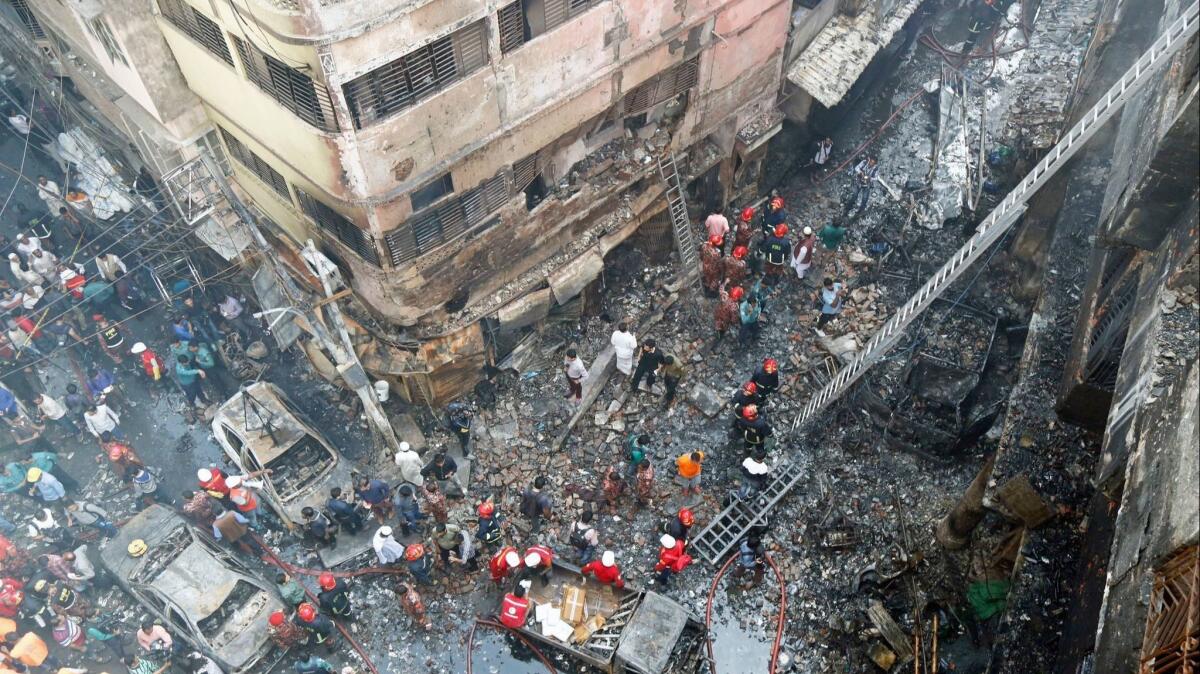Bangladesh officials point fingers in several directions on cause of deadly fire

- Share via
Reporting from Dhaka, Bangladesh — Investigators on Friday were still trying to determine what sparked an explosive fire in a densely packed historic section of the Bangladeshi capital that killed 67 people and injured as many as 41.
Officials offered differing views, suggesting that an errant gas cylinder, a faulty transformer or flammable chemicals could have triggered the blaze that engulfed the warren-like streets of Dhaka’s Chawkbazar on Wednesday.
“We are still investigating the matter to find out the source of the fire,” said Shamsul Alam, chief inspector for the Department of Explosives.
Later, authorities said they were seeking up to a dozen suspects on suspicion of negligence — but did not disclose details.
Many victims are still thought to be missing, and search teams could be seen carrying out the dead in body bags Friday afternoon. Authorities said most of the people who died had no chance of escape. Fire spread with rapid ferocity, trapping people inside buildings as well as pedestrians outside.
The neighborhood’s narrow streets made it impossible for fire engines to reach the blaze, authorities said. Helicopters had to be called in to douse the flames.
The disaster has brought renewed attention to Bangladesh’s poor safety record. Buildings in Chawkbazar are commonly used to store industrial ingredients such as chemicals to make toiletries. The district is known to produce knock-off shampoos and deodorants disguised as major brands.
Fire officials had initially reported a death toll of 81, but later lowered the number to 67.
Chemical warehouses were supposed to have been removed after a 2010 fire in the nearby Nimtoli district claimed 124 lives. That fire was blamed on flammable chemical materials.
Khatibur Rahman, a resident of Chawkbazar, said that there was no enforcement of building codes after that fire and that chemical warehousing remained rampant.
“House owners are greedy,” he said. “They like to rent their houses to the businessmen for warehouses. They pay high rents for their business.”
He said inspectors were paid bribes to look the other way in Chawkbazar, a district in what’s known as Old Dhaka, which dates back centuries.
“The government should strictly monitor and enforce the law and evict the chemical warehouses,” said Rahman, who lives across the street from where the fire broke out in a building called Wahed Mansion.
Eyewitnesses said a gas canister inside a car exploded and sparked the blaze outside the building. Vehicles in Bangladesh commonly run on compressed natural gas or liquified petroleum gas fed through gas cylinders installed in the trunk. Bangladeshis have increasingly turned to buying unlicensed cylinders to store gas amid a persistent shortage.
Alam, the explosives inspector, said it was too soon to pin the blame on a gas cylinder. He said he had yet to find a car with an exploded cylinder or damage to surrounding cars indicative of a cylinder blowout.
“If a cylinder had exploded, all the cars [around there] would be broken into pieces,” Alam said.
But Nurul Majid Mahmud Humayun, head of the Industries Ministry, which oversees the use of chemicals, said the incident had nothing to do with chemicals.
“You have got a very wrong message,” he told reporters. “This is a gas cylinder blast.”
A resident who declined to give his name scoffed at the assessment, saying he was certain a gas cylinder started the fire.
“This is all nonsense, claiming a chemical warehouse was the main reason for this incident,” he said.
Times staff writer Pierson reported from Singapore and special correspondent Abedin from Dhaka.
Twitter: @dhpierson
More to Read
Sign up for Essential California
The most important California stories and recommendations in your inbox every morning.
You may occasionally receive promotional content from the Los Angeles Times.














